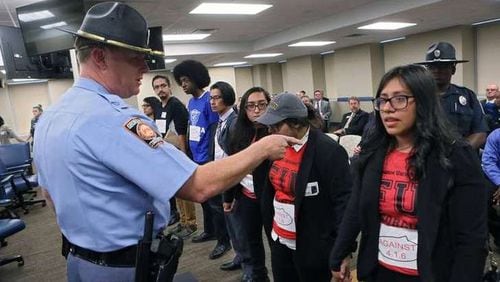A Fulton County Superior Court judge ruled students put on a path to citizenship by the Obama administration’s Deferred Action for Childhood Arrivals program meet the definition of "lawful presence" and are entitled to pay in-state tuition at Georgia's public colleges.
Those students are forced now under state law to pay out-of-state tuition rates, which are three times higher. The ruling by Judge Gail S. Tusan was celebrated by students hindered by their parents' illegal status even though they themselves grew up in Georgia and were legally able to attend K-12 public schools. Ten DACA recipients sued the Board of Regents for the ability to pay in-state tuition at state colleges.
"Defendants have refused to accept the federally established lawful presence of plaintiffs and many other similarly situated students — students who are Georgia taxpayers, workers, and graduates of Georgia public high schools pursuing an affordable option for higher education," Tusan wrote in her decision, which was issued Friday. "Such refusal of a faithful performance of their duties is unreasonable and creates a defect of legal justice that has already negatively impacted thousands of Georgia students."
The ruling does not undo the Georgia policy barring students lacking legal status from attending campuses that didn't admit all academically qualified applicants for the two most recent academic years. The prohibition applies to Georgia Tech, the University of Georgia and Georgia College & State University. The Mexican American Legal Defense and Educational Fund filed a federal lawsuit in September alleging the policy is preempted by federal law and is violating equal protection rights..
While many commenters on this blog contend students should pay a price for their parents' illegal entry into the United States, others believe these kids and the state benefit when they go to college.
A major source of support has been Freedom University, an Atlanta-based group helping DACA students and undocumented students prepare for and get into college. In a statement on its Facebook page, Freedom University said:
The Georgia Board of Regents is "hereby compelled to perform their duty in applying the federal definition of lawful presence as it relates to students who are DACA recipients and to grant them in-state tuition status."
While DACA's future is uncertain in the upcoming administration, this is an important victory in the struggle for equal access to education in Georgia. Congratulations to the courageous undocumented students of the Georgia Undocumented Youth Alliance who were plaintiffs in this case and attorney Charles Kuck who successfully argued the case for in-state tuition!
The court's ruling has dealt a serious blow to the Board of Regents Policy 4.3.4. In addition, Policy 4.1.6., the five-college ban, was partially defeated in November 2016 and is now a three-college ban (UGA, Georgia Tech, and Georgia College and State University).
Freedom is a constant struggle, but with undocumented students leading the way, we will win.







